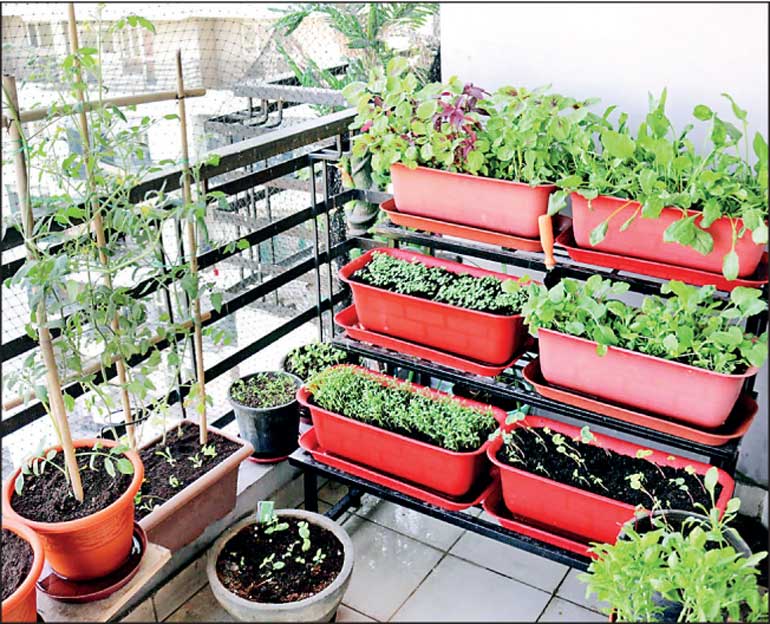Thursday Feb 19, 2026
Thursday Feb 19, 2026
Saturday, 14 May 2022 00:00 - - {{hitsCtrl.values.hits}}

Cultivating in at least a few pots could make a big difference
By Ranjit Seneviratne
Below is how to make a mini-forest on a balcony, using sunlight for food and oxygenated air.
All you need – pots of clay (last longer, more decorative) with pebbles, small stones at the bottom (to drain excess water), then soil with a mix of leaf matter as fertiliser and a few worms to keep the plants healthy.
Large pots are needed for Murunga, Cheena Batu, Berry trees (with edible weeds growing around them), long rectangular pot for mix of salad herbs. A long plastic pot with some area for water seepage keep soil moist for marsh loving Bacopa/Lunuwila. If you have protective bars, have a pot for a vine - Purple yam, Elephant foot yam (with “yams” from the vine too) Kuringnang, Kiri aguna as herb vines, Flowering Nil Katarolu – use flowers for drinks, salads. Thicker the forest – more fresh oxygen – and maybe even do away with the need for air-conditioning.
Making a small part of your garden (even just 8X12 ft) or even less creates a “Community Garden” – which generates joy when sharing food with strangers who pass by. It is possible to utilise land through raised soil beds.
Why? The world today is poisoned by greed – it has infected our minds. New research shows that the mind controls health too. Could this be a factor causing illness and even early death?
Research with toddlers, babies and then with animals shows we are born with “altruism” (sharing nature) and it looks like the competitive “ranking” system in schools promotes greed and the “I want more” syndrome killing this in-born trait.
So if we are interested in good health and longevity, growing a small community garden set up to provide people passing by your home, with vegetables and berries will tend to generate mind-healing feelings of love for others – altruism. If done creatively this could be done even in a balcony well and with the help of some creativity.
A realisation – that poor people know the rich exploit them
A problem that occured with the Community Garden was that some people would break off and almost destroy the murunga trees and uproot the rampe and Sera, etc. It made me realise a shocking fact that the poor did this almost unconsciously, because deep down they realise the “rich” exploit them to earn wealth, so they are “justified” to rob them.
Just think – the country’s “economy” begins with produce made by poor workers – farmers, plantation workers, factory workers, etc. everyone “looking after” them are paid relatively much bigger salaries just to record details of their work, arrange sales, advertise, etc. etc. which just adds to the “cost of production.” Then devices like the “commodities market” are used to artificially increase the sale price even more and this is used to increase the “profit margin” of the owner.
Since “owners” can be targeted by workers, they sell shares so that they can hide behind faceless “shareholders”.
Then accountants try to reduce the “cost of production” which simply means minimising the salaries of the workers. The Government also has a tax on food and this increases the cost of what people pay for food.
Hence what we should adopt urgently is a social policy where we at least informally encourage each other to spread the word on the need to cultivate either in pots or in land, however miniscule. This should be especially carried out as a conservation effort of traditional seed varieties which are almost extinct now because we have not had a national policy to propagate them and save them.
It would of course be best if we had a national policy where help was given for people to carry out cultivation in even the smallest possible manner to help ward off any food insecurity that may emerge. However the fact that we may not have such a policy should not prevent us from seeing to it that we motivate as many people as possible, especially children and teachers as well as senior educators to ensure that cultivation is not seen as a ‘poor man’s job.
System change; prosperity in a pot
It is this mentality that has created great food instability over the past 74 years and as we face severe hardship that could lead to even more severe food shortage, also exacerbated by climatic issues, we should ensure that we the citizens use good sense.
Cultivating in at least a few pots could make a big difference. I know first hand that the smallest spaces can be cultivated and have also seen concretised areas such as Wellawatte transformed, with even mango and plantain trees being cultivated in barrels. This is being done, managing even the smallest spaces. Indoor plants such as Komarika which have great medicinal uses can be cultivated in pots within the homes.
There is now much ado about the concept of system change and we can look at this aspect in a detailed manner from diverse angles pertaining to society and one is through the lens of soil and plant nurturing. If every house could be mobilised to do this in whatever small way, we would have taken one small step to food security.